by Andrew Skelton (Outfoxed)
If you’ll pardon the pun, tycoon games have been on a rollercoaster of a ride since I was young. For a while, they were everywhere, encompassing a wide range of genres from theme parks, to zoos, to office buildings. Then, they just seemed to fade away, with little to take their place. Thankfully, the genre is seeing a bit of a resurgence in recent years and Rise of Industry, developed by Dapper Penguin Studios, fills a somewhat unique niche. You’re not tasked with managing a theme park or planning a town, no. Instead, your goal is to create a thriving industrial empire, mindful of several aspects of business all at once. From supply lines to competitors, can Rise of Industry shine bright?
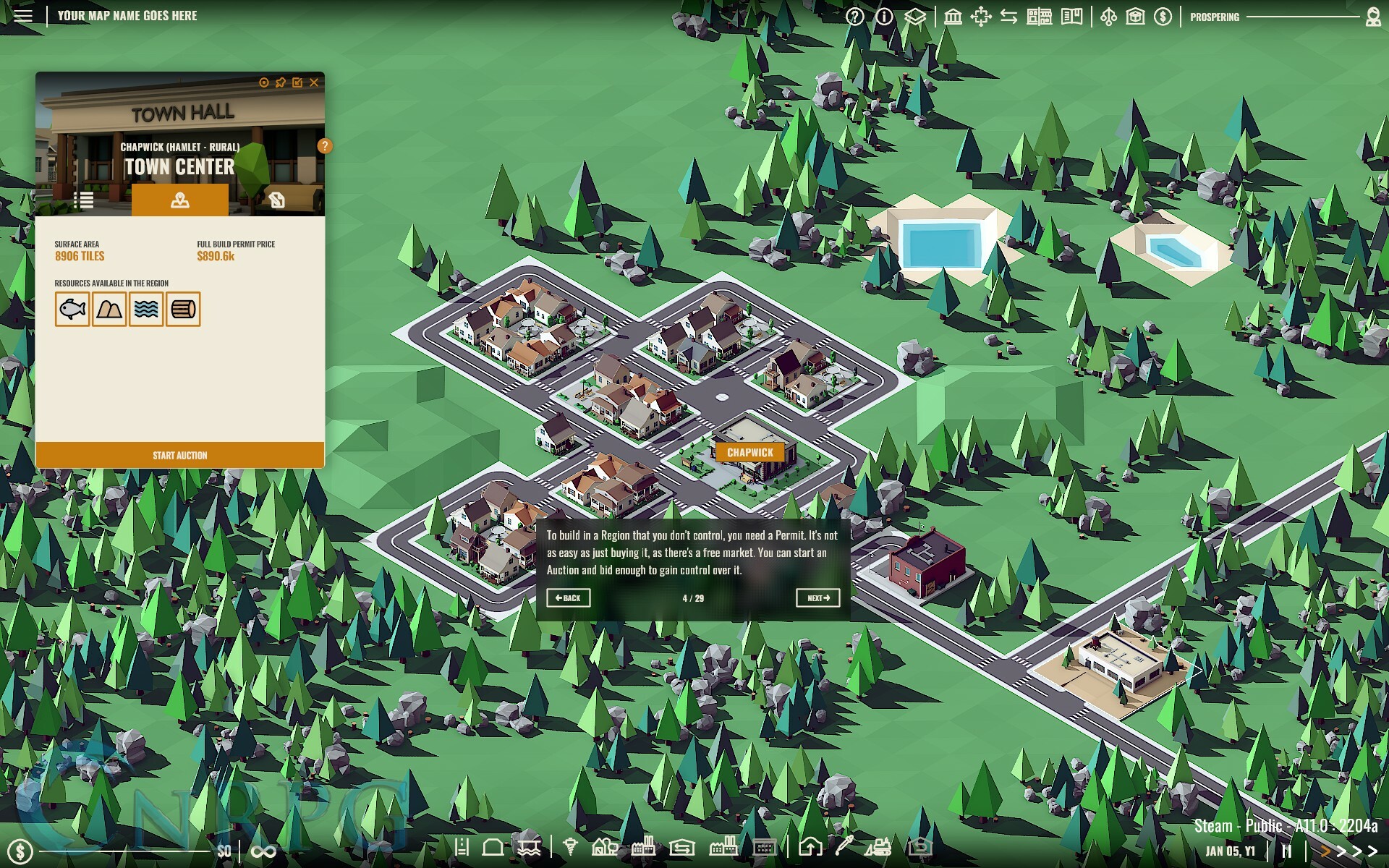
Now, there is a tutorial in place for people who might not understand what tycoon games are about. It does a decent job explaining how to move your camera, how to place and rotate structures, and game specific functions such as collectors that are tied to various buildings. You’re further educated on how to deal with the game’s tech tree, which helps you develop towards your ideal goals. You’re taught about other, more advanced steps like warehouses, which allow you to distribute goods over your expanding industry (at least those buildings within its sphere of influence).
The tutorial, however, does fall a bit flat in some additional core facets, and is downright ridiculous in its execution of others. See, Rise of Industry, to me, is a game about efficiency. You want to get your development as streamlined as possible, and the tutorial gives you a pretty strong example of why spreading out your build is a bad idea. It also doesn’t delve too far into different tiers of production, vital to understand when the towns you’re working with start to grow. Thankfully, there are in game pop-up tutorials that can help you with some of these facets. Besides, it’s a tutorial designed to get your feet wet, right? Learning by doing is very much the theme of Rise of Industry.
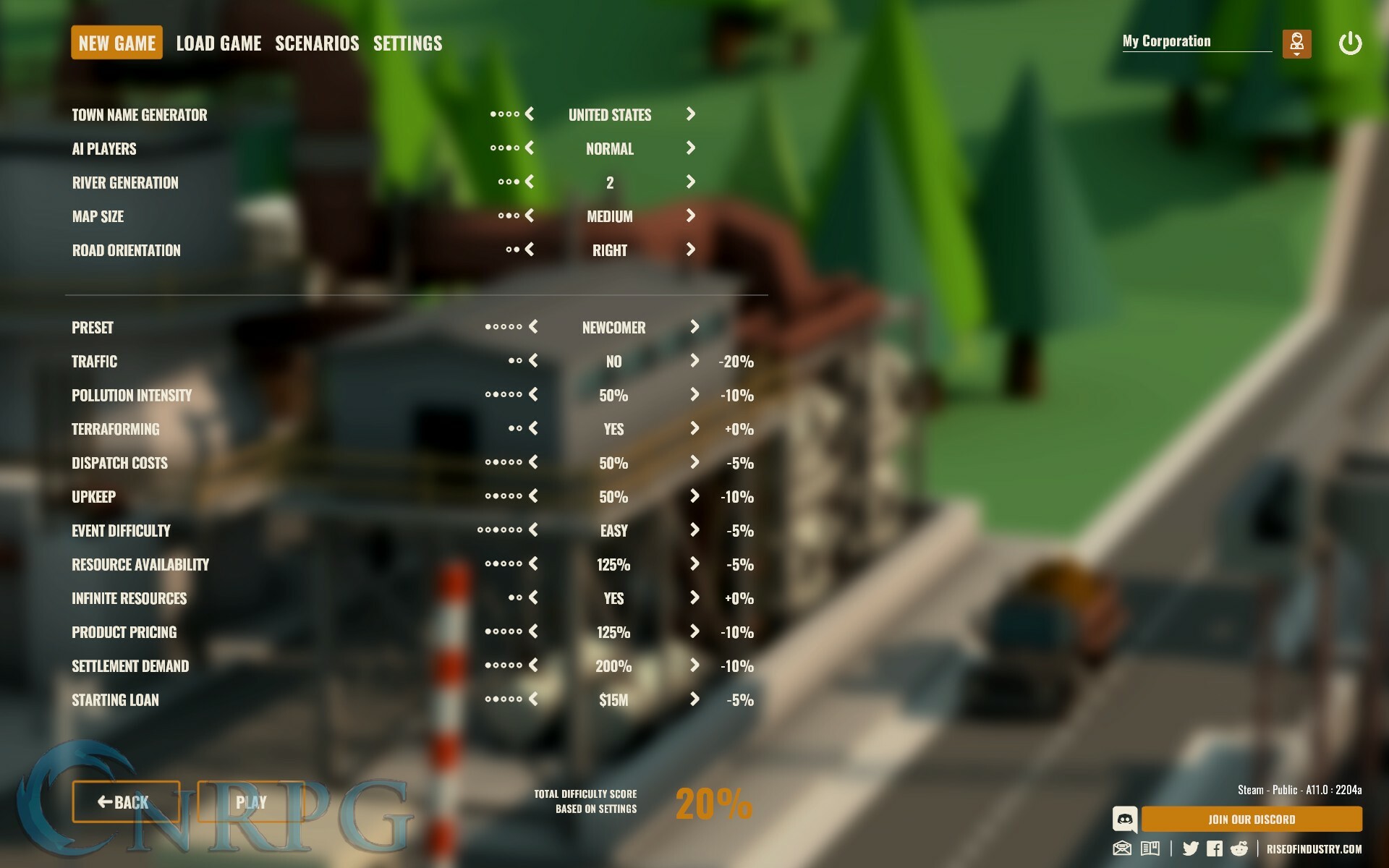
I was quite impressed with the level of game and world building offered, too. Everything from the naming conventions of the towns on the map, to your starting loan, to resource availability and finity are adjustable. Adjusting any of these options changes the total difficulty score higher or lower. For example, the base setting for the Newcomer difficulty (the lowest) is 20%. The higher the difficulty, the more you’re going to have to work and compete against your AI opponents, assuming you added any. Yes, this tycoon game gives you the option to not have other NPCs on the map competing for dominance.
In addition to difficulty settings, you can also adjust how the maps themselves generate. You can determine landscape things such as coastlines, rivers, and hills, and how large they tend to be. You can adjust the amount of natural resources such as iron, gas, oil, and trees appear on any given map. You can even select what buildings are allowed, if the tech tree is available, and even if you can lose a game by declaring bankruptcy.
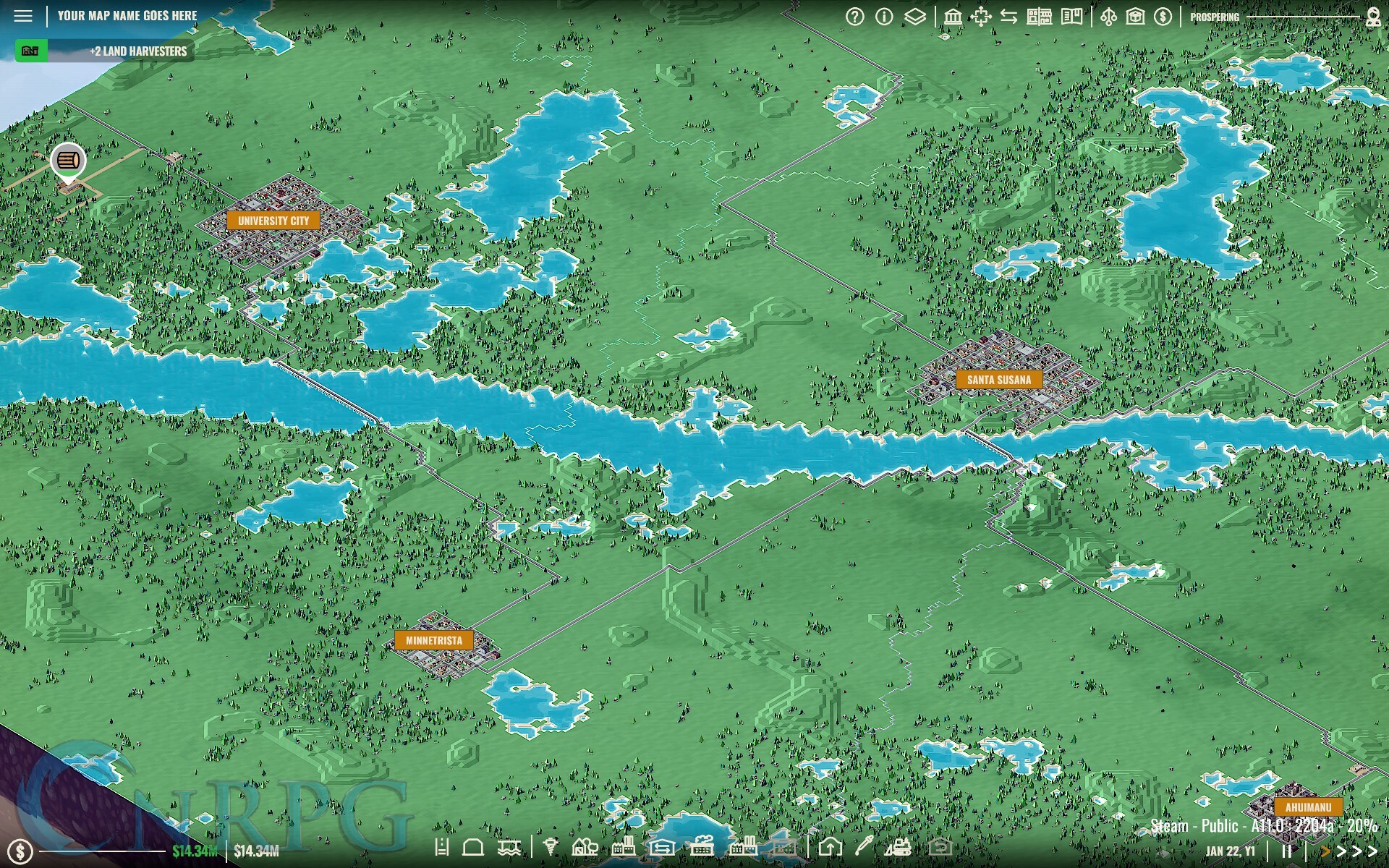
The ultimate goal of Rise of Industry is to successfully create one of three prototypes: a car, a computer, or a pre-made diner. The road to get there, however, takes some planning. Each of these items require specific crafts, and those, too, require specific items. This is where the tech tree comes in handy. You get three free unlocks at the beginning of any game, amidst some other that come free, such as the ability to harvest water. Keep in mind, though, after those three free unlocks, researching takes time and money, and you’re expected to pay off your starting loan eventually. You start with your headquarters in the area of one of several towns dotted around the map, and where you start is very important.
Each of these towns has two to three shops to start with, each with their own demands. A grocer may be in need of wheat and eggs, while a hardware store is looking for lumber and coal. Obviously, your goal is to provide these ingredients to make a profit, attempting to focus on those goods which provide the greatest exchange. As you provide them goods, towns will grow and develop on their own, and eventually will come to you to help them develop further. You’ll need to either provide them raw materials yourself, or the money to purchase them, at which point they will expand further, opening up yet another shop for you to take advantage of.
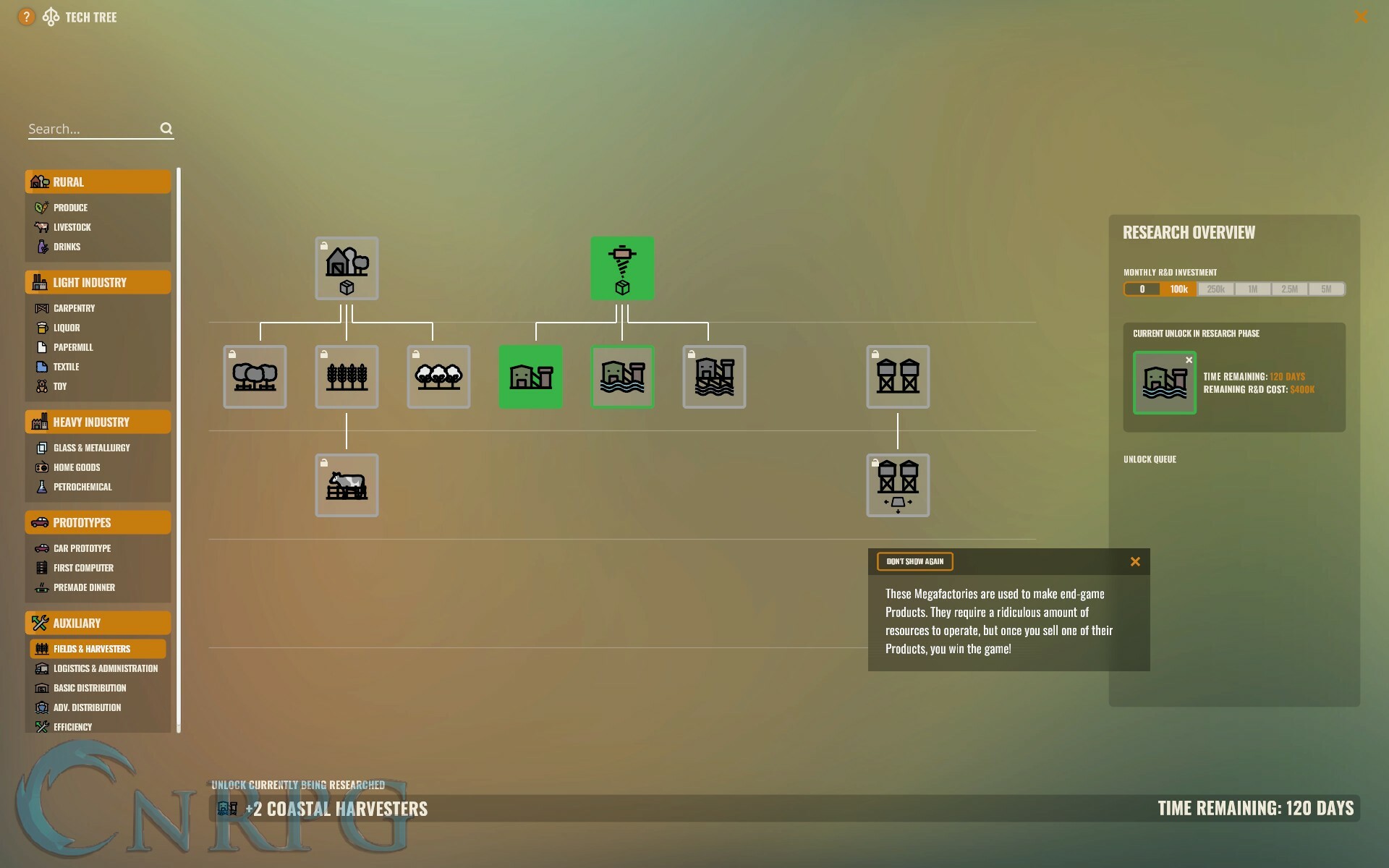
It’s this expansion that truly fuels Rise of Industry, and different shops mean higher tiers of items you’ll be expected to produce. Early on, you can avail yourself simple industry like forestry or farming, but eventually you will need to expand into actual processed goods. Again, this is all to focus you on your goal to create one of those three prototypes. Plus, the deeper into the tree the item, the more money it’s worth, generally speaking. For example, my first game ended up being about brewing beer, because that’s how the town seemed to develop for me.
Of course, industry does come with some pretty hefty issues, namely pollution. Pollution in Rise of Industry is pretty brutal, too, capable of wiping out entire towns if you’re not careful. Pollution, naturally, comes from your factories, and can spread if you’re not diligent in providing protection against them, using air, water, and chemical purifiers to help. Generally speaking, it’s best to shift your factories away from the town, but be aware of the costs of shipping to said town when you do so.
Speaking of shipping costs, there are multiple methods to utilize in Rise of Industry. Sure, you start with the ability to send trucks out for your deliveries, but eventually you’ll be able to utilize trains, boats, and even zeppelins to transfer your goods across the map. Keep in mind, while you have the right to build only in areas where you’ve paid for the right. Occasionally, towns will present auctions for various benefits such as increased yield, better sale prices, and sometimes for the right to build in their area. Just because you can’t build in an area, though, doesn’t mean you can’t ship things there, just understand the cost to do so might be more than the value of what you’re selling.
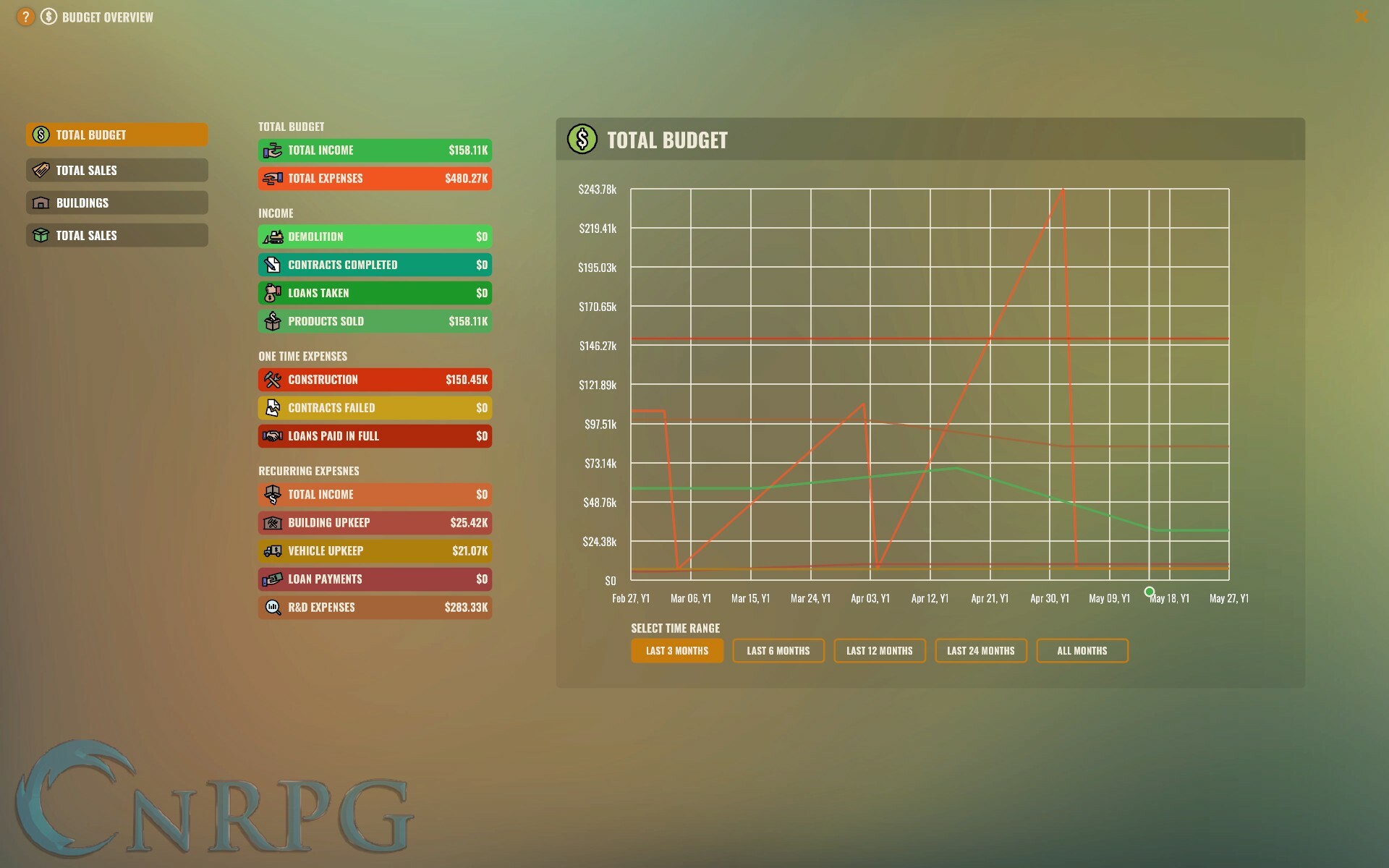
Final Thoughts: Good (3/5)
Rise of Industry sticks to its aesthetic quite well. Its low poly graphics actually fit the style of gameplay quite well, given a sort of 1950s vibe the game gives off. It’s a deceptively simple concept that can easily lead to plenty of time lost into chasing that next big goal, be it expanding your influence or streamlining what you have in place. There are some complaints that maybe the game is perhaps a bit too easy at times, even with higher difficulty modifiers in place. There’s also a case to be made for the tutorial not properly providing an adequate experience as to what you should be doing in the game proper. I feel a lot of people are going to go into the game with the mindset of making as much money as they can, and that’s not what Rise of Industry is about. Again, the focus of the game, its endgame, is to be the first to create one of those three prototype technologies, and follow the path required to get there.
Thankfully, for those on the fence, there is a demo available that should definitely help answer immediate concerns on whether someone would enjoy the title. For me, while I enjoy some of the planning aspects involved, a lot of games I started devolved into, “Find the town which best serves your initial and long term goals and focus on it exclusively,” as it often gave the best return on investment overall. Still, it’s a tycoon game designed to offer a bit more of a shorter experience while giving excessive amounts of replayability overall. Fans of management simulations might find themselves drawn to Rise of Industry quite readily.
Note: A copy of the game was provided for review purposes.
Rise of Industry Screenshots











